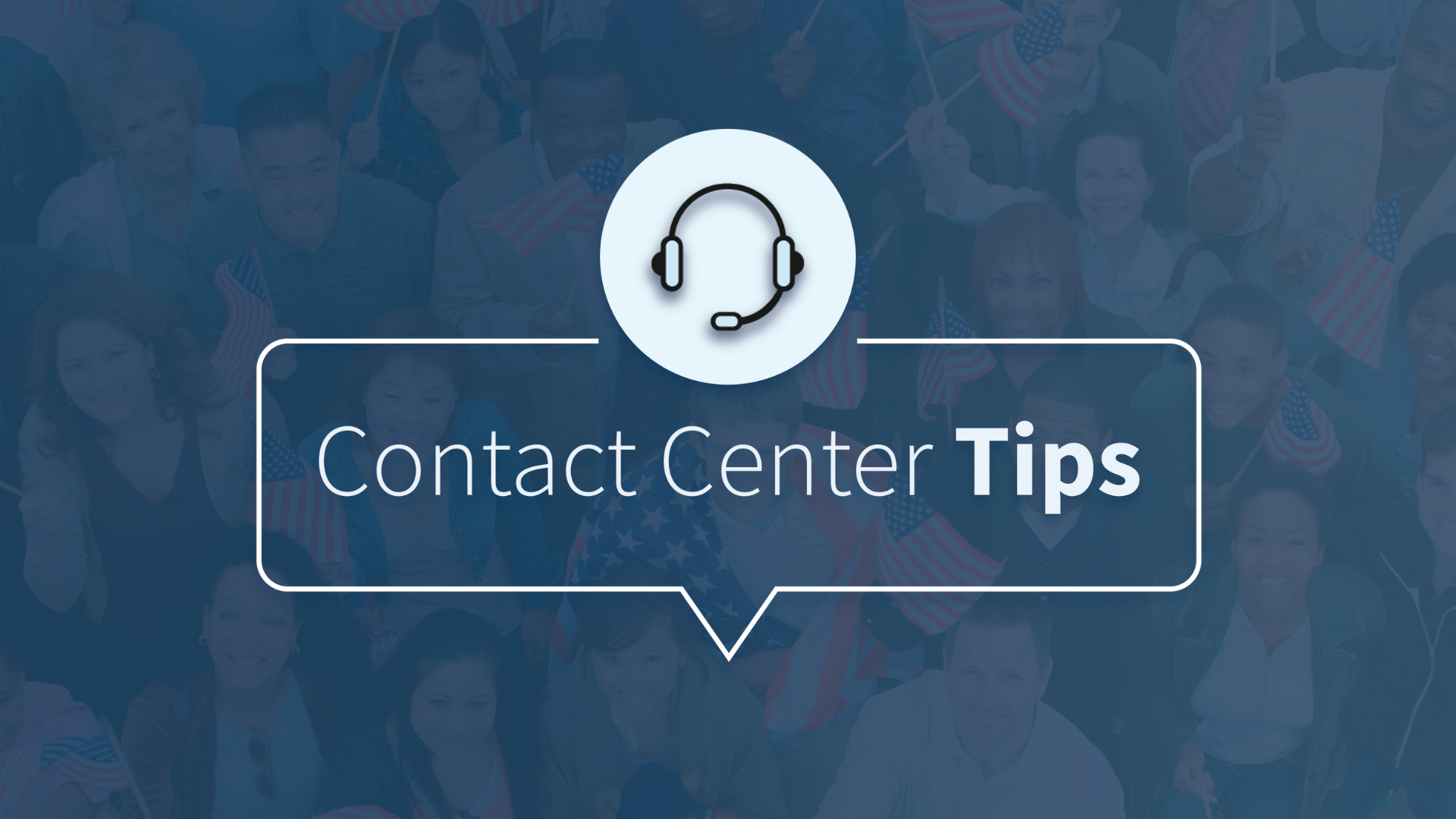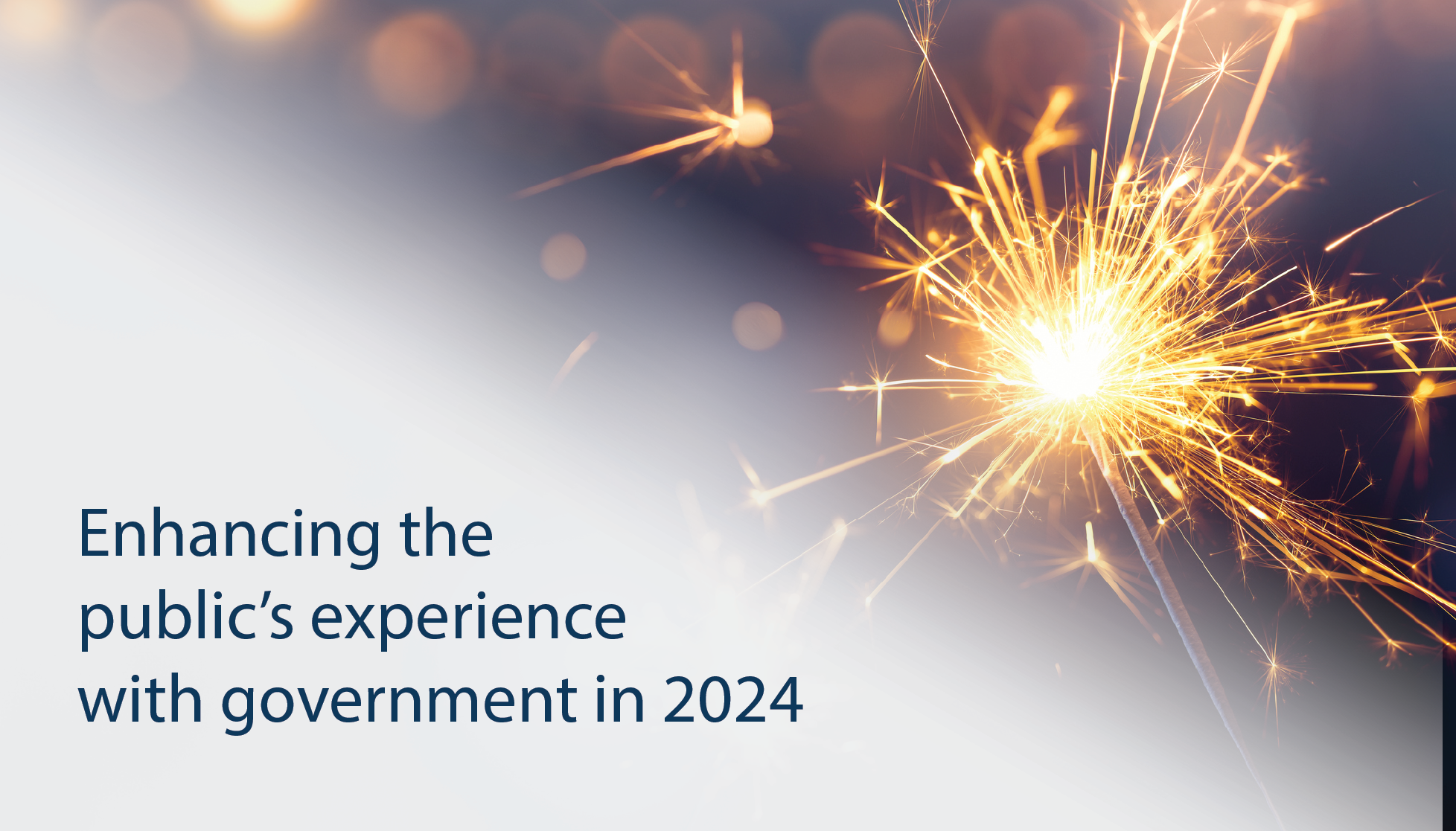The USAGov Contact Center is committed to meeting customers’ needs empathetically, efficiently, and accurately.
When a customer gets in touch, they are looking to be understood, and to quickly get the information they need. But when that doesn’t happen, it can lead to frustration for the customer and the agent. Clear and efficient communication can happen when agents follow some basic practices. Here are three tips we recommend to USAGov agents for interacting with our customers:
- Listen Actively.
We find that customers ask the same question in many different ways. So, it’s important for our agents to communicate back and forth with the customer to gain an understanding and agreement for the specific information they need.
The best way to ensure an agent understands a customer’s needs is to use active listening throughout the interaction. Active listening is simply asking clarifying questions and not relying solely on the first thing a customer says, because the customer may be confused with the government’s terminology and processes.
Here is an example of miscommunication between an agent and a customer. The customer, a U.S. citizen, wanted to confirm if a degree obtained from another country is equivalent to the requirements for the same degree within the United States. But the agent assumed the customer was asking how to find a job in the United States.
Caller: Could you give me some help? My husband is a U.S. citizen, but he studied in Mexico and has a master’s degree in Mexico, but what can he do so he can validate his foreign degree in the U.S.?
Agent: To find a job in the U.S.?
Caller: Yes. I mean–If he can find a job even if he studied overseas, or if he needs to take some extra classes to validate his education from another country?
Agent: I can give you information about how to find a job in the United States.
Caller: But can he find any even though he studied in Mexico?
Agent: I don't know how to answer that. That’s why I am saying if he wants to find a job, he can start looking, according to USA.gov, on the website CareerOneStop, and USAJobs
Caller: Excuse me?
Agent: CareerOneStop.org
Caller: Someone told me that I need to communicate with the [inaudible] to get more information
Agent: What is the name again?
Caller: The letters SEP
Agent: SEP?
Caller: They say I can get information there, but when I put those letters in, it redirected me to your website USA.gov
Agent: The information I am giving you is from USA.gov
Caller: But there it says how to validate a career in the U.S. So I thought that by calling I can get more information.
Agent: So he is studying or finished studying?
Caller: He finished.
Agent: So he needs a job.
Caller: Yes, but my question is if he can do so even though he studied in another country. Is there any document from the U.S. that certifies that he can work here?
Agent: But you said he is a U.S. citizen. He is not a foreigner. That would be different.
Caller: Yes he is a U.S. citizen.
Agent: If he is a U.S. citizen he just needs to find a job in the U.S. on CareerOneStop.org
Caller: I will repeat back to you. [and she did]
Agent: OK.
Caller: Ok. I have to check there to see if he can find a job. And will they give me more information?
Agent: Yes. Do you have another question?
Caller: No. That will be all. I’ll check there.
This happened because the agent did not rephrase the question with the keywords offered by the customer. Listening for and using a customer’s keywords is the best way to begin an interaction and come to an agreement on what is needed. This is the way the interaction should have gone:
Caller: Could you give me some help? My husband is a U.S. citizen, but he studied in Mexico and has a master’s degree in Mexico, but what can he do so he can validate his foreign degree in the U.S?
Agent: Could you please tell me what validating his foreign degree means? Is he trying to verify if his higher education diploma or certificate earned in another country is valid to work in the U.S.?
Caller: Yes. I mean–If he can find a job even if he studied overseas, or if he needs to take some extra classes to validate his education from another country?
Agent: I understand. I will look up some information on how to work in the U.S. if someone has a degree from another country, so he can work in the United States. Is that correct?
Caller: Yes.
Agent: I will start my research to better assist you. Please allow me a few moments.
Caller: Thank you.
Agent: Thank you for waiting. I have found information for you on the U.S. Department of Education website. Please go to ed.gov and type “Recognition of Foreign Qualifications” in the search box located on the upper right corner of the page. This search box will take you to the page about foreign qualifications to work in the U.S. I hope this information can help you. Do you have any further questions?
Caller: No. Thank you so much.
- Rely on your resources.
Agents should avoid providing information based on their memory because government processes may change and the information used before may be outdated. Agents must use the current agency-provided resources to ensure it is the most reliable information. For instance, during the COVID-19 pandemic, information about travel restrictions changed rapidly. What was acceptable one day could be unacceptable the next day. While agents may answer similar questions multiple times a day, information can also change multiple times. Using the latest agency information is the key to providing accurate information.
This is an example of why agents need to check their resources to provide the most up-to-date information:
Caller: Can I travel to the U.S. without a vaccination?
Agent: All foreign travelers, except children, need to have an approved vaccination.
Caller: I am not vaccinated.
Agent: Sorry, this is a requirement.
Caller: Thank you.
This is how this interaction should have gone:
Caller: Can I travel to the U.S. without a vaccination?
Agent: Are you a non-U.S. citizen planning to travel to the U.S., and you want to confirm if you need to be vaccinated to enter the country?
Caller: Yes.
Agent: Thank you for confirming. Allow me a few minutes to find some information for you.
Caller: Ok. Thank you.
Agent: Thank you for waiting. According to our website USA.gov, as of May 12, 2023, noncitizen nonimmigrant visitors to the U.S. arriving by air, land, or sea no longer need to show proof of being fully vaccinated against COVID-19. For further information, you can go to USA.gov and type “COVID-19 international travel advisories” in the search box located on the upper right corner of the page. I hope this information can help you. Do you have any further questions?
Caller: No. Thank you very much.
- Tone matters. Remember to be empathetic.
Customer service agents should be aware of subtle changes in their tone when dealing with customers as this can affect the outcome of a conversation. Even though our agents aren’t directly seeing customers, we recommend that agents smile when interacting with customers. It may sound odd, but it works to improve the tone of the interaction. We understand that agents might face difficult situations, but if they can put a smile in their voice, the interaction will run more smoothly and increase brand rapport.
Using positive statements instead of negative ones will set up a pleasant and more helpful experience for the customer. For example, an agent should use, “Let me see what I can find” instead of “I do not have an answer for that.” When we use positive statements, customers feel they are heard. Being empathetic is always a plus, so saying words such as “I am so sorry you are experiencing that situation,” or “I apologize for the inconvenience,” lets the customer know we are working together to find an answer or a resource. Customers want to know they are not alone in their journey.
This is an example showing how being empathetic can lead to a positive customer experience:
Caller: I am seeking help. My family and I had a home for 14 years and it flooded in September. We are now renting but our lease is ending. We aren't able to be approved for a loan due to 1099 tax returns. I don't know what to do. I've tried for almost a year. My kids need a permanent home. Please guide me.
Agent: I'm very sorry to hear this.
Agent: I understand that you're looking for housing benefits, correct?
Caller: I'm just looking for help getting a home. A permanent home.
Caller: We can't get approved for a home loan due to income. I’ve been passed from person to person. I’m doing everything I'm told by fixing credit etcetera and getting nowhere.
Agent: I'm sorry to hear that.
Caller: Isn't there something for low-income families to help get approved?
Agent: The Department of Housing and Urban Development (HUD) offers a variety of federal programs that may be able to help you purchase a home if you qualify for assistance. You can visit our "Home Buying Assistance" page at https://www.usa.gov/buying-home-programs.
Agent: I hope the information helps. Do you have any more questions?
Caller: Thank you.
In this example, notice how by saying “ I am very sorry to hear this” and later saying, “I am sorry to hear that” the agent is setting a positive tone and rapport with the customer.
Even though we recognize that every contact center might have different goals, we hope these three techniques will help your customers have a positive experience as they’ve helped ours. We’re also continuing to develop new ways of improving communication between the USAGov Contact Center and the people we serve.
Note: USAGov Call Center transcripts have been revised for clarity.
If you’re from a federal agency looking for new ways to reach your audience, learn about partnering with USAGov at usa.gov/partnerships. Connect with us!




.png)